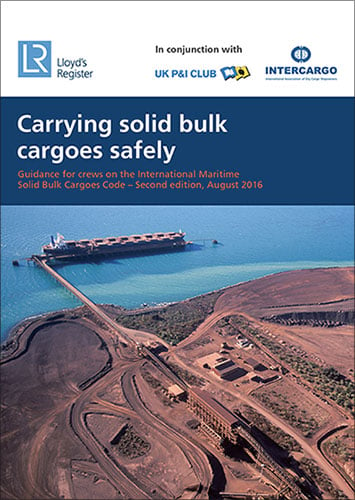Lloyd's Register, UK P&I Club, and Intercargo have released an update to the popular International Maritime Solid Bulk Cargoes (IMSBC) Code pocket guide, designed for ships’ officers and agents who arrange cargoes for loading. When bulk cargoes shift, liquefy, catch fire or explode due to poor loading procedures, the consequences can be critical – ships could capsize, lose stability or sustain severe structural damage.

Carrying solid bulk cargoes safely: Guidance for crews on the IMSBC Code, was first released in 2013 and outlines the precautions that need to be taken before accepting solid bulk cargoes for shipment. It sets out procedures for safe loading and carriage and details the primary hazards associated with different types of cargoes. The guide includes a quick reference checklist and flowchart summarising the steps to be followed. It comes in a laminated flipover format for on-the-spot use.
The new version includes a number of updates, including: a warning on the possible liquefaction properties of bauxite (which was considered until recently a cargo not liable to liquefaction), a new appendix that advises on the issue of cargo residues deemed harmful to the marine environment, changes to the IMSBC Code's structure, advice on SOLAS mandatory enclosed space entry and rescue drills, and various updated references to supporting IMO Circulars.
A PDF of the pocket guide can be downloaded now at www.lr.org/imsbc .
Sam James, LR's Head of Regulatory Affairs, said the guide is extremely useful to crew members as an aide memoire: "Since the release of this guide in 2013 it has heightened the awareness of seafarers, managers, charterers and shippers to the hazards associated with carrying solid bulk cargoes. This new version adds a warning on the potential of Bauxite to liquefy, and will also assist crews with understanding future IMSBC Code requirements related to cargo residues deemed harmful to the marine environment."
Intercago's Technical Manager, Ed Wroe, said: "Intercargo is pleased to have contributed to this useful publication which highlights the key responsibilities of industry stakeholders and the importance of the IMSBC Code. The guide underlines the importance of proper cargo declarations and is also a useful tool for the wider maritime community."
Stuart Edmonston, the UK P&I Club's Loss Prevention Director, added: "The main purpose of the guide is to provide on-the-spot references to help in practical situations."
The new version includes a number of updates, including: a warning on the possible liquefaction properties of bauxite (which was considered until recently a cargo not liable to liquefaction), a new appendix that advises on the issue of cargo residues deemed harmful to the marine environment, changes to the IMSBC Code's structure, advice on SOLAS mandatory enclosed space entry and rescue drills, and various updated references to supporting IMO Circulars.
A PDF of the pocket guide can be downloaded now at www.lr.org/imsbc .
Sam James, LR's Head of Regulatory Affairs, said the guide is extremely useful to crew members as an aide memoire: "Since the release of this guide in 2013 it has heightened the awareness of seafarers, managers, charterers and shippers to the hazards associated with carrying solid bulk cargoes. This new version adds a warning on the potential of Bauxite to liquefy, and will also assist crews with understanding future IMSBC Code requirements related to cargo residues deemed harmful to the marine environment."
Intercago's Technical Manager, Ed Wroe, said: "Intercargo is pleased to have contributed to this useful publication which highlights the key responsibilities of industry stakeholders and the importance of the IMSBC Code. The guide underlines the importance of proper cargo declarations and is also a useful tool for the wider maritime community."
Stuart Edmonston, the UK P&I Club's Loss Prevention Director, added: "The main purpose of the guide is to provide on-the-spot references to help in practical situations."





